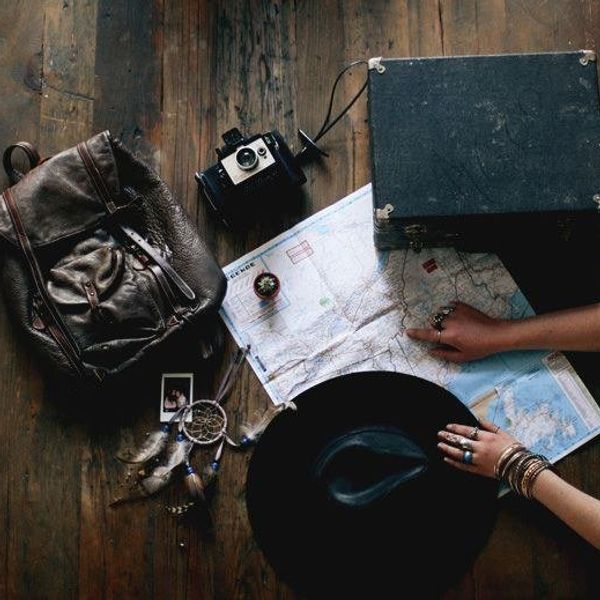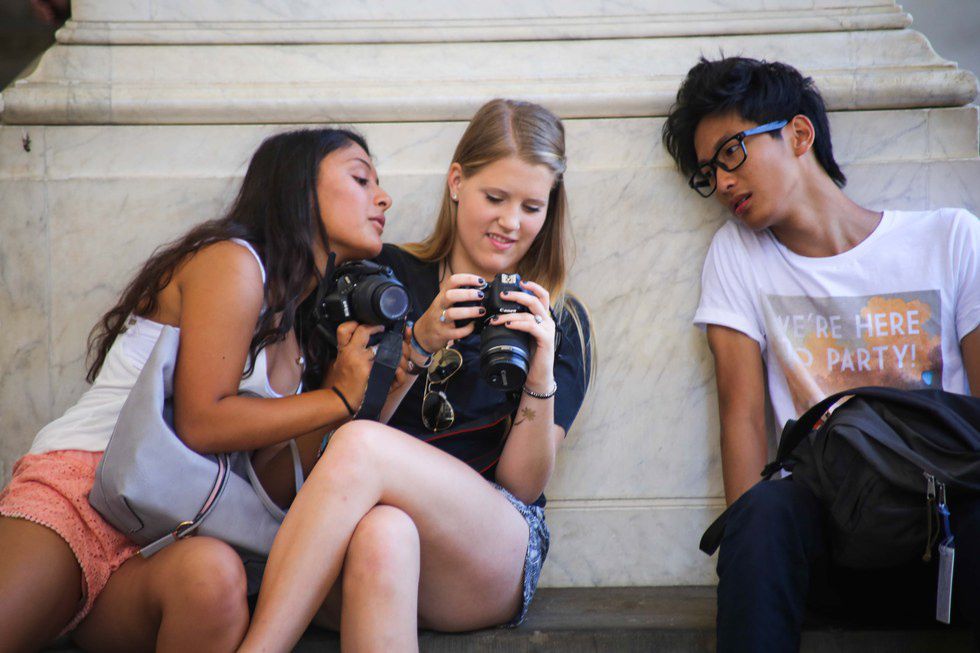So you're going to study abroad! You're about to have a once-in-a-lifetime experience. I'm sure you're getting a lot of advice from friends and family about what you have to see while you're there, about financial aid and about figuring out your budget, as well as advice from professors about how to get the most out of your time while balancing your course load. All this information can be pretty overwhelming. I know it was for me. So here are 14 tips that were given to me or that I learned along the way to make your study abroad experience the best that it can be.
1. Stop saying things are weird.
Yes, things will be different, but as soon as you can get out of the mentality that things that are different from your culture are weird, you'll be able to enjoy your time abroad a lot better. Plus, you'll learn more about your new home if you can understand why your host does things a certain this way, and you'll have fun learning a lot about your new country.
2. Study the physical language just as much as the spoken one.
Understanding that communication goes far beyond verbalization is an important part of feeling comfortable in your new home. For starters, there are certain customs, such as looking people in the eyes, certain words or ways to dress that are acceptable in the United States, that are considered offensive in other countries. Similarly, some things that might make you uncomfortable are the norm in other places. Obviously, you shouldn't tolerate anyone harming you, but being able to accurately interpret body language signals that are different from ours in the U.S. will mean that situations that make mean you feel uncomfortable will just become a part of understanding the new culture.
For example, in many European cultures, embracing and kissing friendly acquaintances is just being polite, but in the U.S. that would be inappropriate. Once you know that's merely the equivalent of our handshakes, you won't be put off by the traditional cheek pecks. Being able to interpret body language in context will allow you to assess social interactions much more accurately than if you are judging by U.S. standards.
3. Be prepared to be met with a wide array of perceptions of the United States.
We all have our own opinions about the U.S. We love some parts and hate some parts, and that's true abroad too! Not everyone thinks the U.S. is the greatest, and they'll have their own stereotypes about you that will make as little sense to you as the ones you have about them. Don't expect that everyone will have only positive things to say about your country. On the other hand many will have a lot of positive views and a lot of curiosity! You'll hear a lot of things that surprise you!
4. Learn from others' perspective of the United States.
Listen to the opinions of others. You don't have to agree with them to learn from them. If someone says that all Americans are arrogant, that's an obvious generalization, but what made them think that? Where did that stereotype come from? What can you do to disprove that stereotype? Truly listening to the point of view of an observer will teach you so much about your own country and yourself.
5. Abandon your own notions about your host country.
You're not going to France to see America's ideas of France. Otherwise you might as well go to EPCOT. Don't go to Beijing expecting the food to taste just like your favorite Chinese takeout. If you sign up for the Americanized version of your host country, you'll be disappointed. Don't let your preconceived stereotypes deprive you of enjoying authenticity because the fake idea of a new country has got nothing on the real deal.
6. Take pictures, but make sure your not just seeing your host country through a camera lens.
Take a lot of pictures! You'll be glad you did! But unless you're there studying photography, snapping pictures to share on social media shouldn't be your main focus. A selfie in front of a beautiful church will mean a lot less if you don't know anything about the church and only looked at it long enough to take the picture. By all means, give yourself a scrapbook full of pictures, but make sure you're leaving time to really experience your host country.
7. Don't forget the study part of study abroad.
I don't mean to sound like a killjoy, but you're not going on vacation. You're here to learn, too, and more likely than not, your courses have been tailor-made to fill you with knowledge that will improve and enhance your traveling. Being able to go and tour the places you talked about in class is a unique opportunity and it will make your travel a lot more interesting! Staying on top of your work will also give you the peace of mind to enjoy your free time without the dark cloud of unfinished work looming over you while you explore new places.
8. Don't forget the abroad part of study abroad.
My advisor talked me out of signing up for the maximum number of credits saying that I wasn't going all the way across the ocean to see the inside of a classroom all day. Courses are important, but so is experiencing your host country. Choose a manageable number of credits so that you can balance your study and your travel without too much stress.
9. Hit the highlights, but that's not all you should do.
Go ahead and check off your bucket-list items. There's a reason everyone wants to see the Colosseum and the Taj Mahal ... because they're awesome. But don't just merge into a tourist when you leave your studies. Take your time in each new city, drop into cafes to soak in the atmosphere or chat with the locals, poke your head in the little shops and save time for some aimless wandering. Some of the most memorable things you'll do are the things you didn't plan, and some of the most beautiful things you'll see are the things upon which you stumble on the way to a tourist hot-spots. These special little moments are the ones that tourists miss rushing from must-see to must-see.
10. Don't be afraid of adventure.
Push your limits and test your boundaries. Try new foods, talk to new people. Do something that scares you a little bit. What is new and exciting to you might be different to other students, so you should carve out your own adventure for yourself. Whether large or small, there is no better opportunity than studying abroad to overcome fears.
11. Find ways to connect with your loved ones without letting staying in touch take over your time.
You'll probably miss home a lot -- I know I did -- and with modern technology making it fairly easy to stay in touch, it's tempting to spend every moment searching for Wi-Fi zones or staying in your room to stay connected online. But your Wi-Fi won't always work and your service will often be slow. That will be even more frustrating if you've planned your schedule around when you can reach home, but at the same time, you don't want to cut ties so much that missing friends and loved ones becomes distracting. Work on finding a balance that fits your goals and schedule, and when you're missing home the most, spend more time with your new friends from your host country!
12. Start referring to your travel plans as travel guidelines.
Travel plans will go wrong, but fixing them is part of the journey! Sometimes buses will be late, trains will be delayed and maps won't always make sense. Allow time for unexpected bumps in the road and try not to let them keep you off track. Who knows, waiting in a late train might give you the chance to explore part of the town you weren't planning to see.
13. Don't be hard on yourself when you just need to rest and have mental breaks.
You're still in college. Just because you're abroad doesn't mean you aren't still entitled to midday naps or days that you don't get out of your pajamas. Don't beat yourself up that you could be out exploring the town. You need your rest in a different country just like you do in the United States. Not every day will be like a travel montogue in a movie. Study abroad won't fix all your problems, so don't expect it to. Let yourself rest, and give yourself time to breathe and process your emotions. If you're well-rested both physically and mentally, you will get a lot more out of your time and travels.
14. Know that there will be culture shock coming home, too, and that's a good thing.
When the foreign feels unfamiliar, that is expected and exciting, but when the familiar feels foreign, that can be pretty unnerving. Being pushed outside of your comfort zone is great and important, but when you have to readjust to your own customs, it feels like you will never have that sense of comfort again. Don't fret! It might be hard at first, but you'll readjust -- you'll be a much more adaptable and self-aware individual. The transition back is tough, but that's just a sign of how much you've grown.



































